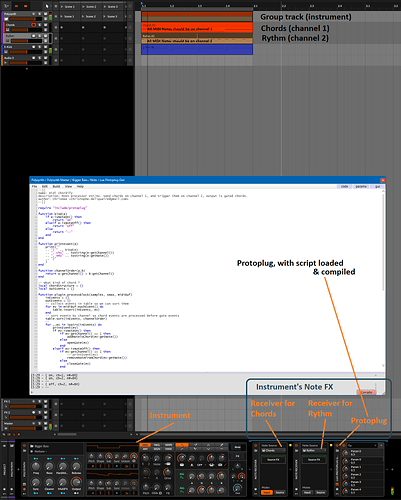It would be useful to be able to combine two Note Clips into one Note Clip, or two Note In into one resulting Note Out, from within the Note Grid.
The resulting notes (combination) would depend on the source clips and a chosen Operator, which would define how the notes from both input Clips would be processed
Operators such as :
- Add(A,B) = merge notes from both sources
- Subtract(A,B) = play notes from A, without notes from B
- Rythm(A,B) = play notes heights from track A, with note timings from track B applied
- Transpose(A, B, root) = play the notes from track A, transposing each note by its relative heights from track B (relative to chosen root)
What problem(s) would this feature resolve?
Combining both using a “Ryhtm Operator” is the main feature here, allowing for flexible and rapid creation of rythm variations of a single note sequence.
It would help to manage rythm and notes heights independently, allowing for faster composition. Separating ryhtm (rythm clips) from chords (chord clips), would allow to have a pool of each (rythm pool, chord pool).
I bet you can see some creative use of the rest.
The whole would allow users to have a rapid composition tool embedded inside the DAW.
A proper study could reveal other use cases and lead to more Operators
How does this feature fit in Bitwig as a product?
Innovation at the heart of Bitwig’s selling point, the desire to elevate above other DAWs and provide a concurrential advantage over the competition
Is there already an alternative way to achieve this on Bitwig?
Don’t know. I tried to implement this using Note Grid, and miserably failed.
An arpeggiator could be used for applying various ryhtms to a sequence of notes, with a much lesser level of comfort, since it would rely on automation, and does not allow the user (composer) to view and manage its ryhtms and its chords using the same tools.
Could it be implemented using Bitwig components or APIs, without Bitwig team’s support?
I’m not sure Note Grid components would fit. The Grid only receives MIDI/Notes signal from a single track ?
Could it be provided by a VST or something else reasonably integrated with Bitwig?
Yes. Composition tools such as Scaler, Captain Chords. They provide their own piano roll and edition tools, which is not convenient.
Are there other products that offer this feature?
Not in the DAW category, but into the composition tools.

